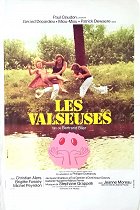Directed by:
Bertrand BlierCinematography:
Bruno NuyttenComposer:
Stéphane GrappeliCast:
Gérard Depardieu, Patrick Dewaere, Miou-Miou, Jeanne Moreau, Brigitte Fossey, Isabelle Huppert, Gérard Jugnot, Thierry Lhermitte, Rita Maiden, Claude Piéplu (more)Plots(1)
Two whimsical, aimless thugs harass and assault women, steal, murder, and alternately charm, fight, or sprint their way out of trouble. They take whatever the bourgeois characters value: whether it's cars, peace of mind, or daughters. Marie-Ange, a jaded, passive hairdresser, joins them as lover, cook, and mother confessor. She's on her own search for seemingly unattainable sexual pleasure. (Cohen Media Group)
(more)Reviews (3)
An independent narrative with great actors who play equally interesting characters. With each passing minute, the storytelling becomes more pleasant and captivating, but it is impossible to forget about the overall sexual unrestraint that starts to gnaw away after a while, whether you want to or not.
()
The film is full of famous names that shaped the face of French cinema over the last 50 years, often at the beginning of their stellar careers. However, its interest - and in a way, its importance - lies elsewhere. It adeptly (if unintentionally) captures the transformation that the intellectual left-wing scene underwent since the pivotal protest year of 1968. Originally, the left was a protest movement that opposed the system, aiming to dismantle it or at least radically transform it. Over two decades, the left completely dominated university grounds, with its progressive graduates integrating into the system and gradually becoming the establishment. This brought about a complete transformation not of society itself, but of the themes and approach of the left, which began to accommodate the needs of its affluent and self-assured members. Social and class conflicts receded into the background, making way for ecology, feminism, and minority protection. Jean-Claude and Pierrot are typical heroes of that original anti-system left and representatives of its values. Unconventional, radical, and disregarding traditional morality, they take from people and life what they deem appropriate. The film's director and screenwriter, embodying these characters, views their actions with a kind understanding. They steal a car, and the owner who tries to stop them is depicted as a despicable bourgeois property owner. Women are mere consumer goods for the successful duo, serving exclusively to satisfy their needs. Icons of that era's leftist movement were often self-centered macho men expecting women to admire them and cater to their needs, which is reflected in the film, where women are fascinated by their dominant behavior and allow themselves to be exploited. Depardieu, I believe, never played such a repulsive creature again, despite having numerous negative roles to his name. Regarding the film's cinematic aspects, I see nothing exceptional or deviating from the French film productions of the 1970s. Due to its unpleasant - and from today's perspective, problematic - content, I cannot give it a higher overall impression than 40%.
()
The journey of the characters, brilliantly portrayed by Gérard Depardieu and Patrick Dewaere with the contribution of Miou-Miou, either captivates you or you refuse to watch it altogether. It's as if there are no rules, there's a lot of casual sex and the ending makes you feel like nothing is really over. Unconventional, but a great film.
()

